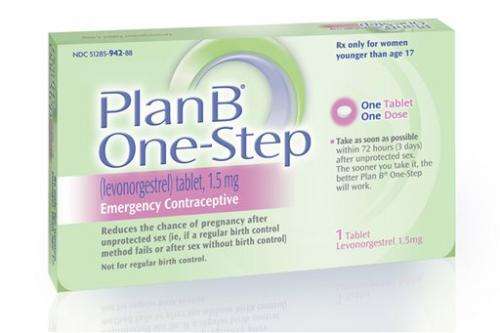US Justice Department appeals morning-after case

(AP)—The Obama administration appealed a federal judge's order to lift all age limits on who can buy morning-after birth control pills without a prescription. In appealing the ruling on Wednesday, the administration recommitted itself to a position Obama took during his re-election campaign that younger teens shouldn't have unabated access to emergency contraceptives, despite the insistence by physicians groups and much of his Democratic base that the pill should be readily available.
A day earlier, the Food and Drug Administration lowered the age that people can buy the Plan B One-Step morning-after pill without a prescription to 15—younger than the current limit of 17—and decided that the pill could be sold on drugstore shelves near the condoms, instead of locked behind pharmacy counters.
That decision appeared to fly in the face of a judge's decision last month that women of any age should be allowed to buy both Plan B and its cheaper generic competition as easily as they can buy aspirin. U.S. District Judge Edward Korman of New York gave the FDA 30 days to comply, and the Monday deadline was approaching fast, prompting the administration on Wednesday to ask the court to put the ruling on hold while it reconsiders.
With the appeal, the Obama administration is making clear that it's willing to ease access to emergency contraception only a certain amount—not nearly as broadly as doctors' groups and contraception advocates have urged. Still, the FDA decision moving the pill from behind the counter to drugstore shelves reflected a societal shift in the long battle over women's reproductive rights, marking a major milestone for those who believe all forms of birth control should be easy to buy.
Reluctant to get drawn in to a messy second-term spat over social issues, White House officials insisted Wednesday that both the FDA and the Justice Department were acting independently of the White House in deciding how to proceed. But the decision to appeal was certain to irk abortion-rights advocates who say they can't understand why a Democratic president is siding with social conservatives in favor of limiting women's reproductive choices.
"We are deeply disappointed that just days after President Obama proclaimed his commitment to women's reproductive rights, his administration has decided once again to deprive women of their right to obtain emergency contraception without unjustified and burdensome restrictions," said Nancy Northup, president of the Center for Reproductive Rights, which filed the lawsuit that prompted Korman's ruling.
Current and former White House aides said Obama's approach to the issue has been heavily influenced by his experience as the father of two school-age daughters. Obama and Health and Human Services Secretary Kathleen Sebelius have also questioned whether there's enough data available to show the morning-after pill is safe and appropriate for younger girls, even though physicians groups insist that it is.
In Wednesday's filing, the Justice Department said Korman exceeded his authority and that his decision should be suspended while that appeal is under way, meaning only Plan B One-Step would appear on drugstore shelves until the case is finally settled. If Korman's order isn't suspended during the appeals process, the result would be "substantial market confusion, harming FDA's and the public's interest" as drugstores receive conflicting orders about who's allowed to buy what, the Justice Department concluded.
Rather than take matters into his own hands, the Justice Department argued to the 2nd U.S. Circuit Court of Appeals that Korman should have ordered the FDA to reconsider its options for regulating emergency contraception. The court cannot overturn the rules and processes that federal agencies must follow "by instead mandating a particular substantive outcome," the appeal states.
The FDA actually had been poised to lift all age limits and let Plan B sell over the counter in late 2011, when Kathleen Sebelius overruled her own scientists. Sebelius said some girls as young as 11 were physically capable of bearing children but shouldn't be able to buy the pregnancy-preventing pill on their own.
Sebelius' move was unprecedented, and Korman had blasted it as election-year politics—meaning he was overruling not just a government agency but a Cabinet secretary.
More than a year later, neither side in the contraception debate was happy with the FDA's surprise twist, which many perceived as an attempt to find a palatable middle ground between imposing an age limit of 17 and imposing no limit at all.
Any over-the-counter access marks a long-awaited change, but it's not enough, said Dr. Cora Breuner of the American Academy of Pediatrics, which supports nonprescription sale of the morning-after pill for all ages.
Even though few young girls likely would use Plan B, which costs about $50 for a single pill, "we know that it is safe for those under 15," she said.
© 2013 The Associated Press. All rights reserved.

















